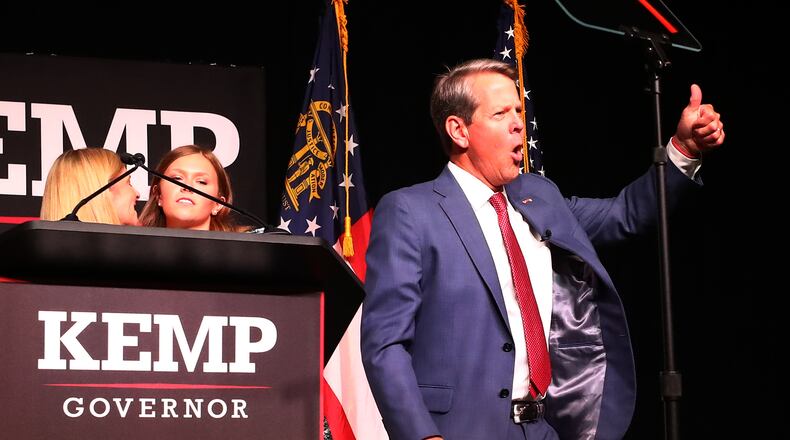Ahead of the primary against David Perdue, Gov. Brian Kemp wielded the power of incumbency with ruthless efficiency. He’s now stepping up a similar strategy to thwart Democrat Stacey Abrams in the general election.
The governor plans to unveil a $1 billion tax rebate financed by Georgia’s record surplus this week, according to officials with knowledge of his plans. It’s the second time this year he’s promised a check from the state’s coffers.
His administration is also exploring a separate rebate for homeowners, with plans to roll out the details at a press conference on Thursday at the state Capitol. The proposals are the first significant policies he’s outlined for his second term.
The expected announcement comes the same week Abrams plans to unveil more details about her economic agenda, one that already includes promises of pay raises for teachers and some law enforcement officers, as well as her own plan to refund taxpayers more than $1 billion. Her refund would be almost identical to Kemp’s proposal.
For Kemp, it also reflects his bet that the power of incumbency — broad authorities that have helped him advance priorities, consolidate GOP support and command media attention — will neutralize Abrams’ enormous fundraising advantage.
Though the Democrat reported more than twice as much money in her campaign accounts as Kemp, she has reminded supporters she faces an “uphill battle” in a political climate that’s favorable to Republicans.
“While Brian Kemp can rely on the advantage of incumbency to garner media attention,” Abrams’ top aide Lauren Groh-Wargo wrote in a recent memo pleading with donors for more cash, “our campaign has to spend money to get our message out.”
‘Superpower’
The governor, indeed, has leveraged his office to solidify Republican support and woo independents and swing voters.
He’s soaked up headlines by touting every economic development announcement, from proposed Hyundai and Rivian auto plants promising thousands of jobs to a few dozen new staffers in rural Georgia, as proof his economic agenda is working.
He’s traveled the state promoting an infusion of federal money from coronavirus relief legislation and a bipartisan infrastructure measure opposed by many congressional Republicans, including members of Georgia’s delegation.
And every month, he’s enjoyed a fresh round of media coverage for signing an executive order that extends a tax break on gasoline a few more weeks, which he frames as his way to fight “Biden-Abrams inflation.”
The latest announcement came as his administration deals with the fallout of Music Midtown’s cancellation — an abrupt decision last week that officials say was triggered by the legal fallout over a 2014 pro-gun law signed by then-Gov. Nathan Deal.
“They know how to use the powers that the office affords — starting with the advantage of an historic surplus that he’s wielding effectively,” said Brian Robinson, one of Deal’s top aides and a longtime Republican strategist.
“They’ve got to use the power of his office to generate news because he’s up against a force that commands national attention in a way that no challenger in Georgia history ever has,” he added.
“That’s her superpower, but he can rely on his own advantage: The authorities of one of the most powerful governor’s offices in the country.”
Georgia governors make appointments to courts and dozens of state boards and commissions, with big campaign donors often getting first dibs.
They decide how much money the state spends, and recommend where it goes. In the case of the billions of dollars in federal COVID-19 aid the state has received, Kemp has the sole authority to say where the money is spent.
He also has made the most of it by holding press conferences to announce law enforcement bonuses, high-speed internet grants to rural communities and other expenditures from federal funding he, in some cases, opposed.
Governors also promote and sign laws. Kemp has gotten plenty of free publicity this year by holding signing events, including one in Perdue’s hometown to ink an income tax rate cut passed by lawmakers.
In January, Kemp used an annual breakfast meeting of Georgia business leaders to call for a $1.1 billion income tax refund using last year’s surplus, and the General Assembly approved it in March.
Abrams’ campaign cast the Kemp tax proposals as another in a series of attempts to one-up her agenda.
“While Brian Kemp is following Stacey Abrams’ lead in calling for tax rebates, he’s still pushing an extreme and dangerous agenda that threatens Georgia families and puts our economy at risk,” said Abrams spokesman Alex Floyd.
‘Focused’
For Kemp, the latest moves are a continuation of what his aides vowed would be an all-out effort to nullify Perdue’s chances when the former U.S. senator entered the race for governor with Donald Trump’s support.
Kemp orchestrated the appointment of his rival’s cousin, former Gov. Sonny Perdue, to lead the higher education system. He appointed a spree of conservative jurists to open seats on the bench and inked significant jobs deals.
On the campaign trail, Kemp has focused less on contentious conservative issues that helped him vanquish Perdue, such as guns and abortion.
Instead, he’s focused on his economic platform, including his decision to reopen parts of Georgia’s economy near the start of the coronavirus pandemic. He’s likely to pitch his new proposals as a way to help Georgians cope with higher prices.
“Georgians are going to stay focused on what they care about,” he said at a campaign stop in northeast Georgia. “And what Georgia families and working Georgians need right now is for us to fight the 40-year high inflation.”
About the Author
The Latest
Featured




